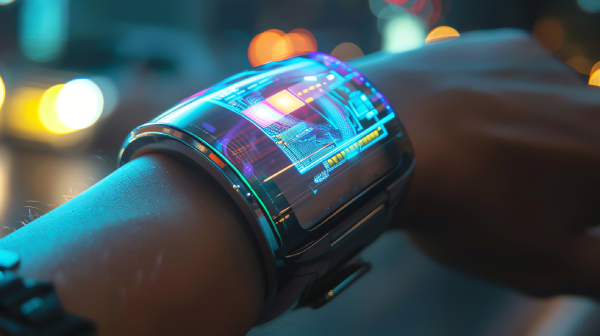The Latest Innovations in Wearable Technology for Fitness and Health
Introduction
Wearable technology has revolutionized the way we approach fitness and health. In recent years, advancements in this field have significantly impacted how we monitor our well-being. This article explores the latest innovations in wearable tech, highlighting how these devices can enhance your fitness journey and health management.
Wearable Tech: A Brief Overview
Wearable technology refers to electronic devices that can be worn on the body. These gadgets track various metrics related to health and fitness. From smartwatches to fitness trackers, the range of wearables has expanded significantly.
The Evolution of Wearable Technology
Initially, wearable technology was limited to basic fitness trackers. These devices could measure steps taken and calories burned. However, with advancements in technology, wearables now offer much more. Modern wearables can monitor heart rates, sleep patterns, and even blood oxygen levels.
Key Innovations in Wearable Technology
1. Advanced Heart Rate Monitoring
Heart rate monitoring has become more precise and comprehensive. Newer devices use optical sensors to measure heart rate variability (HRV) and detect irregularities. This technology can provide early warnings for potential health issues.
2. Enhanced Sleep Tracking
Understanding your sleep patterns is crucial for overall health. Wearables now offer detailed insights into sleep stages, including REM, deep, and light sleep. This data helps users improve their sleep quality and overall health.
3. Blood Oxygen Monitoring
Devices with SpO2 sensors can measure blood oxygen levels. This feature is particularly useful for individuals with respiratory conditions. It provides real-time data, helping users manage their health more effectively.
4. Stress and Recovery Monitoring
Modern wearables can also monitor stress levels and recovery times. These devices use metrics such as heart rate variability and skin temperature to gauge stress levels. They can suggest relaxation techniques and recovery strategies.
5. ECG Monitoring
Electrocardiogram (ECG) monitoring is now available in some wearables. This technology can detect irregular heartbeats and potential heart conditions. Regular ECG readings can help users and healthcare providers keep track of heart health.
6. GPS Tracking
For outdoor enthusiasts, built-in GPS tracking is a valuable feature. It allows users to track their routes, distances, and speeds. This data is beneficial for runners, cyclists, and hikers who want to monitor their performance.
7. Personalized Fitness Coaching
Some wearables offer personalized fitness coaching. These devices analyze your activity levels and provide customized workout plans. They adapt to your fitness level and goals, ensuring a tailored approach to training.
8. Integration with Health Apps
Wearables now integrate seamlessly with various health apps. This integration allows users to sync their data across multiple platforms, providing a comprehensive view of their health and fitness progress.
9. Smartwatches with Health Features
Smartwatches have evolved beyond simple notifications. Many now include advanced health features such as heart rate monitoring, sleep tracking, and even stress management tools. They offer a comprehensive approach to personal health.
10. Improved Battery Life
Battery life has been a significant concern for wearable devices. Recent innovations have led to improved battery life, allowing users to wear their devices longer without frequent charging. This advancement enhances the overall user experience.
The Impact of Wearable Technology on Fitness and Health
Wearable technology has transformed how we approach fitness and health. These devices offer real-time data, which helps users make informed decisions about their well-being. The ability to track various health metrics empowers individuals to take control of their fitness journeys.
Benefits for Fitness Enthusiasts
For fitness enthusiasts, wearables provide valuable insights into their performance. Metrics such as heart rate, calories burned, and distance covered help users track their progress. This data can be used to set goals and improve workout efficiency.
Benefits for Health Management
In terms of health management, wearables offer early detection of potential issues. Features such as ECG monitoring and blood oxygen tracking can alert users to irregularities. This early detection is crucial for preventing serious health conditions.
Choosing the Right Wearable for You
With so many options available, choosing the right wearable can be challenging. Consider factors such as the features you need, your budget, and compatibility with other devices. Researching and comparing different models can help you find the perfect fit for your needs.
Top Wearable Devices of 2024
Several wearable devices stand out in 2024 due to their innovative features and performance. Some top choices include:
- Apple Watch Series 9: Known for its advanced health features and seamless integration with iOS.
- Fitbit Charge 6: Offers comprehensive fitness tracking and long battery life.
- Garmin Forerunner 965: Ideal for serious athletes with advanced GPS and performance metrics.
- Whoop Strap 4.0: Focuses on recovery and strain monitoring, providing valuable insights into overall health.
Future Trends in Wearable Technology
The future of wearable technology looks promising with ongoing advancements. We can expect to see even more sophisticated health monitoring features and improved integration with other smart devices. The focus will likely be on enhancing user experience and providing more actionable insights.
Conclusion
Wearable technology continues to evolve, offering new possibilities for fitness and health management. The latest innovations provide users with valuable data to optimize their well-being. As technology advances, we can anticipate even more exciting developments in the world of wearables.
Stay updated with the latest trends and innovations in wearable technology by following getnewupdates.com.













